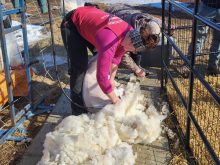Alberta cattle producers are now eligible to set up Net Income Stabilization Accounts.
In a close vote at the Alberta Cattle Commission annual meeting Dec. 5, delegates voted in favor of joining the program.
Producers from both sides argued over the merits or the folly of joining a program that many once rejected as an undesirable subsidy.
Lorrie Jesperson of Barrhead said producers in his area want NISA.
“I keep hearing the question, why can’t we as cattle producers use it?”
Dale Schaffrick, also of Barrhead, said cattle producers may have to use subsidies to ensure survival.
Read Also

Charges laid after cattle theft
Saskatchewan RCMP lay two charges against a man after six cattle went missing.
“We should use the ones that are at our disposal,” he said.
Two years ago, the United States launched a costly trade action against Canada, charging the industry was subsidized to the detriment of the American cattle industry. Canada won the dispute but the defence cost more than $5 million.
The NISA was not relevant in that countervail investigation because most of the cattle came from Alberta where the program did not exist.
Fear of a renewed trade challenge fueled the debate for ranchers like Hugh Lynch-Staunton of Lundbreck.
“I would benefit personally from this at my age and the current state of our operation but I’m disappointed that we have to debate these things over and over again,” he said. “It sends out the message that our industry doesn’t think we can stand on our own feet in the marketplace.”
David Pope of High River said he is opposed on principle. NISA may be acceptable under international trade rules but the U.S. may revisit the issue regardless.
“If some of our members take the subsidy, it will come back to haunt us and start another challenge of some sort,” he said.
Kevin Boon of Delia also fought against the resolution.
“This has a huge potential to jeopardize the largest industry we have in the agriculture sector in Alberta in ways which would affect all of us negatively if trade actions are put against us,” said Boon. “I’m not sure that jeopardizing a multi-billion dollar industry that we all depend on is worth that risk.”
Boon fears joining NISA could harm programs like industry development funds and place further demands on a limited producer levy.
Governments have already questioned why they should provide additional support when there is more than $3 billion held in NISA across Canada.
Others said the program is misused as a retirement savings plan and for those in genuine need, there is not enough available money to keep them in business. They called for a mandatory payout so it is not guarded like a nest egg.
Ken Moholitny, of the Alberta Agriculture safety net division, said joining NISA is as simple as writing a letter to Ottawa asking for inclusion in the 2000 tax year.
“Your net sales on cattle will just become part of the eligible net sales category,” he said in an interview. “If you are a straight cow-calf man without a NISA account, now you will be able to establish one. If you are in the high part of the cycle, it makes sense to put money aside for when prices go down.”
In the previous safety net arrangement with the federal government, there was more money available to Alberta for other programs since cattle were excluded. The province could not dictate specifically where the money went but most of it likely supported the farm income disaster program that is available to all commodities.

















